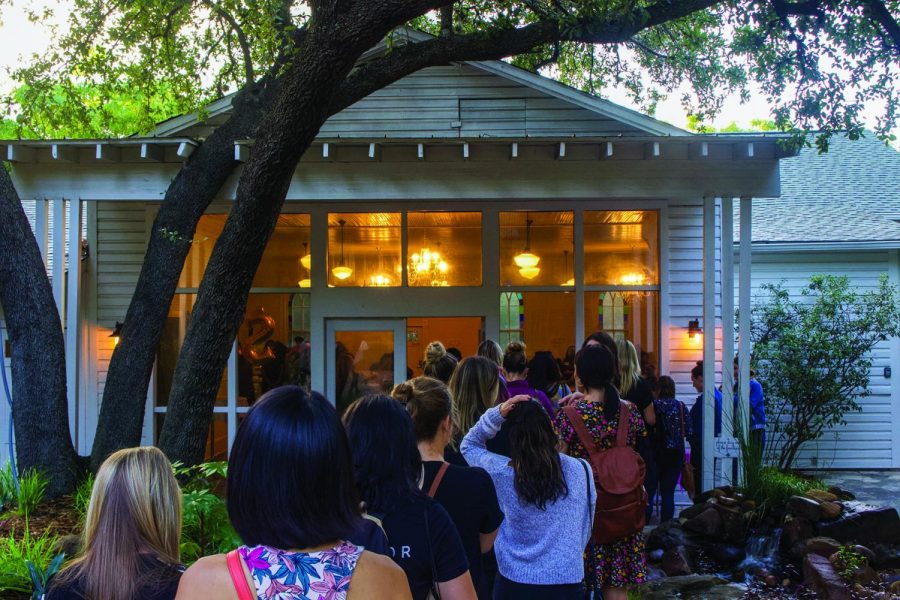Ladies Get Paid town hall puts college women ahead for the future
Elizabeth Ucles / Hilltop Views
Host Brantly said the waitlist for the town hall was the same number as attendees.
When Allegra Moet Brantly touched down in Austin, she wasn’t sure how she was going to shake the financial scene for women in the Capital City. Brantly left New York City after the nationwide expansion of Ladies Get Paid, a New York-based organization that empowers women and their finances through town halls, meetups, conferences and corporate programming.
On Wednesday, Sept. 12, Mercury Hall hosted the Austin branch’s town hall with an emphasis on investing. The venue quickly became filled with women from an array of investing experiences. Brantly’s impact became noticeable as she opened the evening by saying the event waitlist had just as many women as the tightly-packed venue.
“To have equality, we need to have financial equality,” said Brantly before handing it over to the four panelists.
The panelists included COO of The Financial Gym, Bridget Todd, active member of Pipeline Angels, Tanya White, real estate investor Steph Douglass and Wells Fargo Financial Planner, Whitney Morrison.
Pens tried to keep up with all the advice: from the stock market to startup investing. But these are the three facets the panelists touched on for women just getting started on their investing journey.
Retirement
Thinking about retirement as a college student may seem odd, but Morrison said considering retirement in that first job is an invaluable way to begin investing for the future.
“Retirement accounts are awesome, but they truly are for the long term,” said Morrison. “So when I’m thinking about, okay, ‘how do I want to invest and how do I want to get started?’ That’s a really great place because you’ll be getting a higher return.”
The Certified Financial Planner explained the benefits of a brokerage account which allows money to come out with no penalization. Morrison said the account is like a savings account, but with taxes, as the account grows– allowing for greater life goals savings.
“They use [brokerage accounts] for things like ‘oh, in five years I’m going to buy a house. Not going to put in my [retirement account] because then I’ll get penalized. I’m going to put it in this after-tax brokerage account,” said Morrison. “So you have complete flexibility, you just gotta pay the taxes.”
Real Estate
After you’ve been saving to buy your first house, real estate expert Douglass said that putting 20 percent down is not the be-all-end-all for down payments.
“You can put five percent down, and that’s the government saying ‘we want you to invest in the real estate market, we want to get you here,’” said Douglass. “In Austin, it’s really hard to save up $60,000, that’s basically the minimum if you want to own a home in Austin city limits for 20 percent down.”
After living in her first primary residence for a year, Douglass then got a second primary residence, rented out her first and repeated the cycle. This cycle led Douglass’s property portfolio to increase to 15 units in the last five years– bumping her net worth to $920,000.
Douglass said this mode of operation is a slow but surefire way of building your investment portfolio.
Student Debt
With Todd’s vast financial training experience, she said you shouldn’t wait until your student debt is cleared before investing. The Financial Gym COO said student loans are cheap debt with interests ranging from four to five percent. At the end of the day, Todd said it’s a numbers game.
“You could earn 10 percent by putting it into one of these syndications,” said Todd. “If it’s only costing you three percent, you just made seven percent by putting it into an investment instead of paying down the debt.”
Todd said student debt is going to be a factor, but it shouldn’t dominate financial decision-making.
“There are ways you can control, to an extent, how much you owe,” said Todd. “You don’t want to wait until you’re 40 to buy a house. Don’t delay your life just to pay that debt.”






